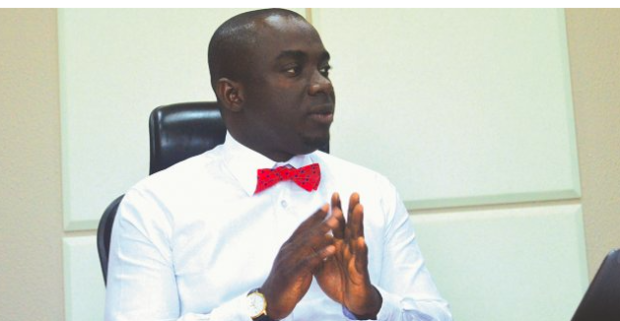The Sixth Defense Witness in the ongoing trial of the founder of defunct Beige Bank has told the High Court in Accra that, when a customer’s account is debited, that customer will receive an automatic debit alert notification.
Herod Mensah, former Branch Chief Executive of the Tema Community (1) also said when such debits are received the customer’s first point of complaint will be the branch manager or Relationship manager.
Mr. Mensah, in his Witness Statement which has been adopted by the Court presided over by Justice Afia Serwah Asare-Botwe, said, there was no way customers’ funds would be moved that they would not receive an alert notification.
“If transactions are posted into the account of any customer and these transactions turn out not to have been sanctioned by the customer, that customer would definitely lodge a complaint at the bank,” he explained.
“This is because the customer would have received an alert on their phone about the transactions or would have seen them in their bank statement.
“This is standard practice and banks actually encourage their customers to bring to the attention of the bank, any anomalies they detect on their statements,” the Witness told the Court.
“I must add that throughout my experience in banking, there has not been an occasion where a customer would refuse or neglect to lodge a complaint when there has been an unauthorized transaction on their account.
“Indeed that would be an unusual behavior from any such affected customer,” the former Branch Chief Executive stated.
It is his case also that, “No officer of the bank has the capacity to move funds standing to the credit of any customer from their account without the express consent of the customer. This is not possible.”
For that to happen, he said, “then that officer may either be a signatory to the account or they may have forged the signature of that customer. In any case, from my experience as a BCE, such a matter would have been reported to the branch immediately after it happened because the customer would definitely receive an SMS alert in respect of the transaction or they would have seen the same on their bank statements.”
Mr. Nyinaku, the founder and Chief Executive Officer of the defunct bank has been charged for allegedly stealing GH¢2.1 billion of depositors’ money from the bank.
He has since pleaded not guilty to 43 charges including stealing, fraudulent breach of trust, and money laundering, and has been granted bail.
Movements of funds
Though the Witness told the Court that, he was not in the capacity to speak to transactions involving the movement of funds from the current accounts of Beige Capital Assets Management (BCAM )and whatever transactions happened thereafter, he has personal knowledge of the movement of funds.
“….I could speak to the issue of the movement of funds from the current accounts of individual customers of the bank. I am able to speak to this because as BCE of the bank, we were the officials responsible for directly engaging with the bank’s customers.
“Therefore as the frontline officials of the bank, any issue that was an anomaly would first be reported to and known by the branch. When this is known to or brought to the attention of the branch, we will take steps to rectify it,” he stated.
“When the branch is unable to rectify it, the matter will then be escalated to another level for further action to be taken,” Mr Mensah stated.
“To properly explain the facts above which I am privy to and the role I played in them, it is important to explain how the internal structures of the bank were organized.
“I have had to explain how the bank was structured in order for the court to appreciate the fundamental fact that, first of all, the point of contact between the customer and the bank is at the branch level, and at the branch level, the customer may deal with tellers, relationship officers or operations officers all of who reports to the BCE,” he told the Court.
Hierarchy of structure
He added that “between the BCE and the CEO, there are so many layers in the hierarchy of the leadership structure at the bank [as mentioned in the previous paragraph| that hardly would a BCE ever engage with the CEO.
“I must add that throughout the time I worked with the bank, the only times I met or engaged with the CEO were at monthly performance review meetings where he would be addressing all BCEs or when he paid a courtesy visit at my branch.
Again, for ease of management, the bank is structured into several departments which perform specific functions.
All of these departments had a head at the management level who bears responsibility for and supervises matters that happen at the branch and which concern functions within their department concerning these functions at the branch level.
Some of the departments included; finance, admin, banking operations, marketing, and compliance amongst others, and the most senior officials who were responsible for these functions were the Chief Finance Officer [CFO], Head of Admin, Chief Operations Officer [COO], Chief Marketing Officer [CMO], and Chief Compliance Officer [CCO] respectively.
For purposes of clarity, I would explain the functions of the various departments listed above.
As can be inferred from the structures explained in the preceding paragraphs, there’s hardly any contact between customers of the bank and the CEO except for courtesy visits. Where a customer wants to do business, the contact place or person where or with whom such business would be transacted would be at a branch and or with an official of a branch.
Customers’ instruction processes
He told the court that, in banking practice, bank accounts are operated by mandates.
In the context of banking, he said, “mandates are the persons who have the right to issue instructions in respect of transactions concerning any account.”
He further explained that, in every bank, “when an account is opened for a customer, the bank requires the customer to provide specimen signatures of the officials who would act as mandates to the account. Be it a personal or corporate account, there has to be a mandate.
“Account holders are therefore made to sign their specimen signatures which are scanned and uploaded into the bank’s system.
“The reason why the bank requests for these specimen signatures is because any transaction advice that is received by the bank must be signed by the signatories to the accounts. Besides the specimen signature, the bank also requests to have photographs of the signatories to the account.
“Thus when an instruction is received from an account holder, the operations team checks to ensure that the signature on the instrument bearing the instruction matches with the specimen signatures of the account holder.
“This is a mandatory requirement that must be satisfied before the transaction can be processed.
“Because banks have several branches and these branches are connected, customers of the bank have the luxury of going to any branch of the bank to transact their business.
He stated that, at that branch, “the teller or operations officer is not likely to know the customer in person, especially where the account is not domiciled at the branch.”
He said the situation is even worse if the transaction advice is not presented by the customers themselves and this is very common practice.
“Thus in all situations, what the teller at the bank relies on to process the transaction is the signature on the transaction advice.
“The teller looks at the transaction advice and compares the signature with the specimen signature in the bank’s system to confirm if the features agree,” he explained.
“As I have earlier explained above, the department within the bank that processes transactions relating to customers’ accounts is the banking operations department.
To buttress his point, he said “When I say ‘process’ in this context I mean the effecting of entries into the accounts of customers which entries would appear on the bank statements of the affected customers.”
Thus, “at the branch level, the officials who represent or act as banking operations officers are the tellers and Operations Team Leaders [OTLs].”
“Instructions from customers come in several forms. It could be in the form of a cheque, transfer advice, or even an email in the case of customers who patronize e-banking services.
“The instructions may be presented to the bank by the customers themselves, their assigns, or through their relationship officers.
“Whichever form the instruction is issued, it must necessarily be signed by the account holder and the signature must necessarily match the specimen signature in the bank’s system,” the Witness said.
“When the branch receives an instruction from a customer, these officers [i.e. the teller and OTL would first of all perform processes to verify the validity of the instruction.
“When these officers, teller and OTL| are satisfied with the validity of the instruction then they would proceed to make entries in the banking system/software to affect the transaction,” he added.

Source: StarrFmOnline.com
 Home Of Ghana News Ghana News, Entertainment And More
Home Of Ghana News Ghana News, Entertainment And More




